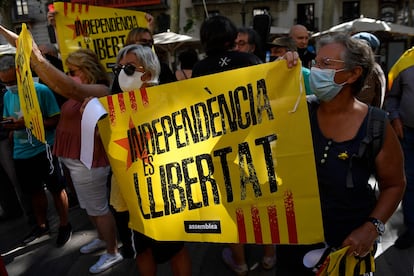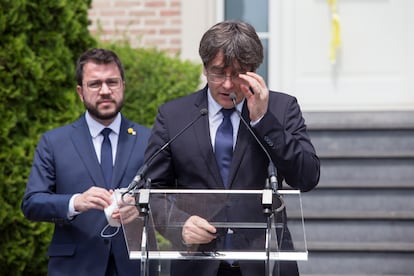Poised to pardon jailed Catalan separatists, Spain’s PM may get little thanks
Pedro Sánchez traveled to Barcelona on Monday to explain his plans, but he faces opposition from all sides, including the independence movement which views the clemency as ‘a farce’
The Spanish government is poised to approve pardons for nine jailed leaders of the failed 2017 secession attempt in Catalonia. The move will be authorized at the Cabinet meeting on Tuesday, according to Prime Minister Pedro Sánchez.
The leader of the Socialist Party (PSOE) made the announcement on Monday during a speech to outline his roadmap for the region. His address, titled Reencuentro: un proyecto de futuro para toda España (or Coming together again: a forward-looking project for all of Spain) was being held inside the landmark Liceu theater in Barcelona before an audience of around 300 people that did not include members of the Catalan government.
“The pandemic has reminded us that we need one another. Almost always to reach an agreement, someone has to take the first step,” said Sánchez on Monday. “We are going to rebuild social harmony from respect and regard. We cannot start from scratch, but we can start again. We love you Catalonia.”
📺 Cuando Sánchez anunciaba los indultos, un simpatizante de Arran (juventudes de la CUP) ha gritado: "¡No pactéis los indultos! Independencia o sumisión. ¡Muerte al estado fascista!". "Ya has tenido tu momento de gloria, chico", decían en el público https://t.co/5ewizVFsbZ pic.twitter.com/sRdtN0aCNw
— EL PAÍS (@el_pais) June 21, 2021
Spanish Prime Minister Pedro Sánchez is heckled on Monday at the Liceu theater by a pro-independence protestor (Spanish and Catalan audio).
The nine individuals found guilty of sedition were sentenced to between nine and 13 years in prison, and some have now been behind bars for three-and-a-half years, including their time in pre-trial custody. This group includes Oriol Junqueras, the leader of the Catalan Republican Left (ERC), who was deputy premier when Catalonia held an outlawed independence referendum on October 1, 2017. That was followed by an independence declaration passed by separatist parties inside the regional parliament. The Catalan premier at the time, Carles Puigdemont, fled Spain to avoid being tried for these events and has since been living in Belgium.
Three other former Catalan government officials who were found guilty of disobedience and barred from holding public office for one year and eight months, but not sent to jail, have already served out their sentences and are therefore not targeted for pardons. They are Carles Mundó, Meritxell Borrás and Santi Vila, who are free to run for office again.

The Spanish leader is hoping that the show of clemency will help improve relations with the independence movement and facilitate new talks on the future of the region, where a recent election delivered a majority to the separatist bloc, although the Socialists were the most-voted party.
“I am convinced that taking nine people from prison, who represent thousands of Catalans, is a resounding message of the will for social harmony in Spanish democracy,” Sánchez told the audience at the Liceu theater.
Granting the pardons is proving to be the most complicated and risky decision made to date by Sánchez, who has two years left in office. The executive is aware that the decision is taking a toll and dividing its own Socialist voters. Despite adverse opinion polls, Sánchez’s team is hoping that there will be enough good news out of Catalonia in the coming months to turn the tide of opinion.
On Monday, Madrid premier Isabel Díaz Ayuso of the main opposition Popular Party (PP) said that Sánchez’s political future is ending. “This betrayal cannot be forgiven, his days are numbered. People can put up with other things, but this is unbearable,” she said in interviews on esRadio and Telecinco.
Sánchez will face considerable opposition from several sources, not least from separatists who view the move as grandstanding. The National Catalan Assembly (ANC), a civil society group that played an active role in the push for secession – and whose leader Jordi Sànchez is one of the nine people behind bars – asked supporters to demonstrate outside the Liceu on Monday against “the farce.” The far-left party CUP has also called a protest.
Carles Puigdemont, the former Catalan premier who fled to Belgium to avoid arrest, on Friday urged Sánchez to explain his plan inside the Catalan parliament. “You can listen to opera, even do plays at the Liceu, but it’s in parliament where you do politics and where messages need to be sent,” he said in a joint public appearance with current Catalan premier Pere Aragonès, who had traveled to Waterloo to meet with him.
The independence movement is suggesting that the Spanish government’s clemency is a result of international pressure. The European Court of Human Rights in Strasbourg is about to consider appeals by Jordi Turull, Josep Rull and Jordi Cuixart, three of the nine politicians and activists who were found guilty of sedition and misuse of public funds by the Supreme Court in October 2019.
Another jailed leader, Oriol Junqueras, has suggested that Spanish court decisions will be struck down by European courts, and that the Spanish state “is now trying to protect itself against the abusive measures it took earlier.” Junqueras also said that “we defend amnesty, a referendum and independence. If, for that purpose, we are more useful outside [prison] than inside, then we evidently wish to be useful.”
Sánchez will also face significant pushback inside the national parliament. The PP, the center-right Ciudadanos (Citizens) and the far-right Vox have been framing the pardons as the political price that Sánchez is paying for separatist lawmakers’ support in the Congress of Deputies, where the Socialists head a minority coalition government with junior partner Unidas Podemos.

After receiving support from economic and religious leaders last week, Sánchez will now have to seek broader backing from society after some opinion polls suggested that a majority of Spaniards oppose the move. Tens of thousands of people demonstrated against the pardons in Madrid on June 13.
The pardons have also received negative reports from prosecutors and from the Supreme Court, underscoring that the decision is chiefly political. As such, the government is preparing lengthy documents – around 30 pages per beneficiary – to explain its reasons for releasing the prisoners.
The main justification is the “public usefulness” of the move, which will “encourage social harmony in Catalonia.” The government feels that its decision is aimed not so much at the jailed leaders themselves, who have shown no remorse for their actions. Instead, the clemency seeks to send out a positive message to Catalan society, particularly its pro-independence members, said sources in the executive. The texts insist on the idea of political normalization after a decade of growing tension.
According to these sources, the pardons will be partial, meaning that they will eliminate the need to serve the remainder of the prison terms but preserve the ban on holding public office. They will also be conditional on the beneficiary’s good conduct, and revoked if the latter commits a crime punishable with prison terms of three to five years.
With reporting by Camilo S. Baquero, Carlos E. Cué, Guillermo Abril and Reyes Rincón.
English version by Susana Urra.
Tu suscripción se está usando en otro dispositivo
¿Quieres añadir otro usuario a tu suscripción?
Si continúas leyendo en este dispositivo, no se podrá leer en el otro.
FlechaTu suscripción se está usando en otro dispositivo y solo puedes acceder a EL PAÍS desde un dispositivo a la vez.
Si quieres compartir tu cuenta, cambia tu suscripción a la modalidad Premium, así podrás añadir otro usuario. Cada uno accederá con su propia cuenta de email, lo que os permitirá personalizar vuestra experiencia en EL PAÍS.
¿Tienes una suscripción de empresa? Accede aquí para contratar más cuentas.
En el caso de no saber quién está usando tu cuenta, te recomendamos cambiar tu contraseña aquí.
Si decides continuar compartiendo tu cuenta, este mensaje se mostrará en tu dispositivo y en el de la otra persona que está usando tu cuenta de forma indefinida, afectando a tu experiencia de lectura. Puedes consultar aquí los términos y condiciones de la suscripción digital.








































